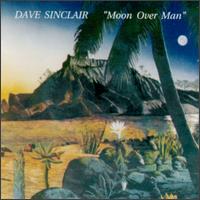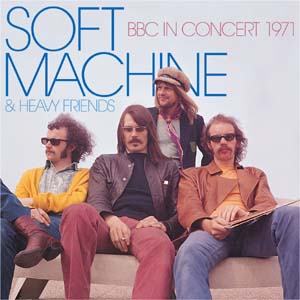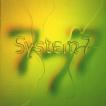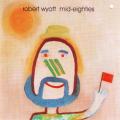record reviews
these reviews first appeared in issue 11 in September 1993
..........................................................................................................................................
PIP PYLE'S EQUIP OUT Up
NTI 396
A real gem from jazzier climes than we've heard for a while. Equip Out's debut album from 1985 (with Pyle, Dean, Hopper and Malherbe) was not a totally convincing amalgam of several Canterbury luminaries: the parts were greater than the sum. This album, however, throws off the shackles of its pedigree and flows.
Elton Dean in full flight is a fine sound: his finest moments, in my book at least, have been as the soloist in semi-free jazz(y) quartets. Soft Machine, Soft Head and now Equip Out bear testament to this. 'Cauliflowers Ears' (on which Phil Miller took the solo in its previous incarnation with the Hatfields TV performance) demonstrates him at his lyrical best.
The album is also a performance of great composure by keyboard player Sophia Domancich: previous excursions into the public eye (notably the Hatfields TV 'reunion') haven't seen her at her most relaxed. It's the wonderfully understated piano on her own composition 'Bimbo' that really states her class. This track features meanderings by double bassist Paul Rogers. Improvised bass solos aren't always riveting: this one benefits from a sympathy with the ambience of the piece and works rather well.
Above all, it's omnipresent drummer Pip Pyle who refuses to be put down - maybe his residency in France has allowed him to steal a march on Magma's Christian Vander. Drummer-led bands, even jazz combos, are rare - Equip Out prove that it can work.
SHORT WAVE Live
Gimini GM1003
This one is definitely a grower. A band that had emerged, according to the sleeve notes, out of a one-off gig for the Le Mans 1991 jazz festival, booked by a promoter who wanted this line-up and this line-up alone, notwithstanding established bands such as Equip Out or In Cahoots.
It's essentially a band renewing old acquaintances: Hugh Hopper (bass), Pip Pyle (drums), Phil Miller (guitar), Didier Malherbe (sax/flute). Only Miller and Malherbe have not, to my knowledge, recorded together before. And it comes over as very much a shared project. Whilst the band originally gigged under Hugh Hopper's name and he writes the majority of an album of original compositions, all of the musicians contribute material. French resident Pip Pyle had much to do with the formation of the band also contributes the sleevenotes, Phil Miller provides much of the basic sound. Perhaps the strongest musical element, which certainly contrasts it to In Cahoots, is a warmer, 'up' feel which is attributable to the flute and soprano sax of Diudier Malherbe. Initially this smooth-edged feel gave me the impression the music might be rather safe, bland, even. Delving deeper, it proves to be mainly a masque for some intricate compositions.
In fact, the album's best moments are contained within the first twenty minutes or so. Phil Miller's high class 'The Fox' is an ideal outlet for Didier Malherbe's swinging tenor: shades of Bloom here as he weaves around a tightly reined, simple fusion base. Pip Pyle's 'Saiseyes' is more complex: typically shifting chords from Phil Miller's guitar synth and Didier Malherbe's floating flute provide the perfect intro to one of those guttural, wrenching guitar solos from the Miller axe with fine accompaniment. from Pip Pyle. And National Health style, an immediate break back into the relative tranquillity of flute and keyboards. Hopper's 'Frankly Speaking' is a masterpiece with Hopper's bass grooving along Franglo-Dutch style, whilst guitar and soprano sax sing along in unison or harmony. This track features a quite beautiful coda: tailor-made for Malherbe's carefree noodling.
Some of the other 11 tracks the same charisma although Hugh Hopper's '2PM' works well as the best of the ballads with a sensitive bass solo. Set against Phil Miller's Cahoots-like chords. Didier Malherbe's 'Et Alors' which follows another of his' rather strange vocal interludes, sees the band breaking out of Pip Pyle's drum pattering into an improvised Pink Panther like finale. Of the rest of the' tracks, there's less to mark them out. Two have been recorded before: Matching Mole's 'Nan True's Hole' here grunged up for a really dirty live performance, and 'Midnight Judo', taken from the first Equip Out albun (which featured three of the players here). Just in case you weren't totally convinced that some of these tracks were recorded live, listen to the fade out to this track and you'll hear a dog barking. Clearly a hound of impeccable taste...
Short Wave are a band that have quickly carved out their own style despite the obvious personnel crossovers with other bands. Whilst Hugh Hopper's band grooves, Equip Out blow and In Cahoots get their heads down, Short Wave owe much to the deft fingering of Didier Malherbe whose playing lifts up the spirit of the music time and time again. This is clearly a band of musicians revelling in the freedom of forgetting heir own projects for a while. Long may it continue.
DAVE SINCLAIR
Moon Over Man
Voiceprint VP119CD
It's a small miracle that this little gem of a record was finally released, 17 years after it was first recorded. Not only was the music out of style then, but it hardly fits in with the rap, metal and alternative sounds so prevalent today. Just goes to show that perseverance, industriousness and good taste in music can work wonders.
Sure enough, it's the Voiceprint label - staunch supporter of everything Canterbury - that managed to release this CD, Dave Sinclair's only solo recording. He recorded the genesis of 'Moon Over Man' shortly following his second departure from Caravan in a university theatre in the summer of 1976. Later tracks were added at the country home of a musician friend, Joe Gubay. According to Sinclair's liner notes, his luck was 'incredibly bad. It was the height of the punk era, and companies were only interested in who could be the most shocking in the noisiest way."
Sinclair later re-recorded four tracks with a live band that included guitarist Mark Hewins, Pete Pipkin (ex Pete Brown's Piblokto) on drums, and early Wilde Flower Graham Flight on bass. He tried selling his songs in London once more, unsuccessfully, then stored his rejected tapes in a loft for the next 16 years.
As most Caravan afficionados would agree, Dave Sinclair's main contributions to that beloved group were his extended, keyboard-dominated suites (eg; 'Nine Feet Underground', and 'For Richard') Those hoping for a continuation of that songwriting style will be disappointed, as 'Moon Over Man' is undeniably a record evincing strong 'pop' appeal. But that doesn't undermine this CD in the least. Most of the 16 songs better reflect Sinclair's contributions to the 1982 Caravan reunion album 'Back To Front' (both projects are co-engineered by Jeremy Darby. My personal opinion is that 'Back To Front' was tarnished by Pye Hastings' overtly commercial songs, while Dave Sinclair's three contributions (plus 'Back To Herne Bay Front' by cousin Richard) provided the bright moments.
In any event, 'Moon Over Man' 's greatest achievements are the beautiful melodic arrangements. Some of the songs are on a part with anything Hastings or Richard Sinclair wrote, even during early Caravan days. 'Wanderlust', 'Tropic Island' and 'Mallorcan Dance' open the record and give it a breezy, cosmopolitan feel, accentuated by the Spanish phrasings of the singer Gay Perez on the latter track. Perez lends her voice to a number of songs here, which brings up my first complaint: the peppy, commercial songs given her are in strong contrast to Sinclair's soft romanticism on other songs, creating a sort of split personality. 'Lost in the Woods', and the title track are both gorgeous tunes sung by Perez, but these are the exceptions. The other Perez-sung numbers sound like they're from a completely different record.
Additionally, 'Moon Over Man' has its share of fillers. 'Ice Cream' seems a little too quaint, 'Reminiscememoring' sounds like a weak 'When I'm 64' and 'Harry' is just silly. But these weak points ,are easily compensated by other songs: the dreamy, evocative 'Wanderlust'; the painful self-examination in 'Where Have I Gone'; 'Here To Stay' as the record's optimistic closer; and (arguably) the stand-out track, the autobiographical 'Piano Player' (which appeared on Caravan's The Album'). I'd swear Pye Hastings sings on this cut, though the liner notes credit lyricist John Murphy on vocals. Sinclair himself sings lead on several tunes, as well as a guy called Tim Link.
Recommendation? 'Moon Over Man' reaffirms the wide-ranging song-writing talent in Canterbury, proving that Dave Sinclair is a better writer of tunes than anyone thought. And besides, the artwork is cool… too bad we can't get an album sleeve.
Peter Kurtz
SOFT MACHINE
Live In Concert
Windsong WINDCD 031
From a period in their history which produced a prolific number of tape bootlegs, this official Soft Machine release from the BBC archives spotlights one of their more unusual performances. Many regard the period between 1969 and 1971 as the finest in the band's history, although those distrustful of the Softs' jazz leanings watched the vocal contribution of Robert Wyatt (and Kevin Ayers before him) dissipate to nothing by the time this set was recorded. This release probably represents as free a blow as the band were to extend to, before the tighter structures of the Karl Jenkins version reined the band in once more.
What's unusual about this concert is that the band's accepted line-up by this time was the quartet of Hugh Hopper, Mike Ratledge, Robert Wyatt and Elton Dean. Yet now we see the band not only augmented by Elton Dean's freeblowers on all three tracks, but on the first two more or less hijacked. 'Blind Badger' and 'Neo Caliban Grides' are both taken from the admittedly excellent Elton Dean solo LP, two of the more accessible moments from that release, yet still demanding listening. Neither Hugh Hopper nor Robert Wyatt appear on 'Blind Badger' - the line-up incorporates instead bassist Neville Whitehead, cornet player Marc Charig and drummer Phil Howard, who appear, on 'Grides' too. So this part of the concert is very much Elton Dean territory, reflective of the Soft Machine's direction at that time, if not necessarily their normal sound or make-up, given the absence of Hopper and Wyatt.
The medley which comprises the third track is more recognisable, since the band is cut to its basic quartet until the final moments, and plays entirely Soft Machine compositions. Even given the rousing big band cacophony of 'Teeth' (where the band arc, joined by Charig, trombonist Paul Nieman and Roy Babbington on acoustic bass, as well as an understandably bemused Ronnie Scott), the medley's finest moments are Elton Dean's solo parts on 'Kings and Queens' and the everimpressive 'Out Bloody Rageous'. I never tire of hearing new versions of the exploratory, stretched-out themes that dominated Third and Fourth, not least because every version asks new questions or showcases a different player. It's common knowledge that Robert Wyatt was alienated from the band within its latter stages, but his inventive drumming provides the bulk of the backdrop for 'Eamonn Andrews' and is a tower of strength through 'All White'.
Whilst the Softs' Proms release represented a slice of cultural history, this collection finds the band on better form, yet on far from safe ground given the uniqueness of both the lineup and material. There are many better documents nf the live history of this band but since most are only taped bootlegs, it's unlike', that we'll ever hear them in this sort of sound quality. Certainly in such a fascinating environment.
SYSTEM 7
777
Weird and Unconventional Records BFLCD1
'777' doesn't so much mark a change in direction for System 7 as a redefinition of ideas. Gone are the guest vocalists from the 'System 7' release, gone are the guitar solos, gone are most of the techno mixmasters. Gone too are most of the hybrid styles explored on the last album_ For some older Steve Hillage fans this could remove the last remaining links with the past; for fans of the anbient house genre it sees his work move closer to that of collaborationists The Orb.
In tandem with Miquette Giraudy. Hillage has assembled a series of sound collages using guitars, yes, but also keyboards. treatments and all the armoury of today's progammer. Most tracks are driven along by house rhythms, and as far as this release goes, the subtler the better. 'Ghost' suffers from a techno-ish overblast of drum patterns, whereas the excellent '7:7 Expansion' (released as a single) accumulates blissful layers of keyboards to compete with the backbeat. The delightful eastern touches with voice samples and percussion for 'On The Seventh Night' recall Hillage's legendary Om Riff - I wonder if Hillage has been tempted to readdress 'Master Builder' in the same way as Gong tackled 'Fohat Digs Holes in Space' recently… 'A Cool Dry Place' is a collaboration with The (aforementioned) Orb and there are shades of 'Blue Room' here for sure. In contrast, the set is wound down exquisitely with the final two pieces: the trance-like 'Ship Of The Desert', featuring tasty guitar bites and undulating rhythms, and the peaceful 'Faydeaudeau',. which takes ns back into Rainbow Dome territory.
Steve Hillage work of this nature is always going to be shelved alongside that of The Orb, undoubted masters of the genre. Ironic to think that his work should consciously ape that of a band whose major influence was himself! Whilst The Orb still pull all the punches when it comes to spontenaiety and creativity, '777' is more homogenised, more structured and more polished than System 7's first release. And that makes it a fine album in my book.
ROBERT WYATT
Mid Eighties
Rough Trade R2952
Robert Wyatt has been involved with Rough Trade for over a decade now,with an open-ended licence to write and release material. He has hardly been prolific during his time with Rough Trade but his output has been consistently challenging. On the heels of the highly successful 'Dondestan' comes this compilation covering the trust of the Rough Trade years. Although 'Mid Eiqhties' comes with the same cover artwork as their earlier release 1982-1984', this is a more complete and satisfying compilation.
Included are all of the Work in Progress' EP: the Hispanic covers 'Yolanda', Te Recuerdo Amanda'; the cover of Peter Gabriei's hit 'Biko' and the deliberate 'Amber and the Amberines' co-written and performed with Hugh Hopper. Also included are two further covers from the B-side of the hit 'Shipbuilding'. Robert Wyatt's sympathy for the jazz tradition has rarely manifested itself so poignantly as on 'Memories of You', lending his sould also to a re-working of 'Round Midnight'. Old Moler Dave MacRae addes keyboards.
'Old Rottenhat' is reproduced in its entirety. This is a fine album of original compositions which married a more mainstream pop approach with some of Robert's most uncompromising political lyrics. This is stirring stuff: a damning microcosm of British and western perspective during the early Thatcher years. 'Old Rottenhat' sits happily alongside the two rarest (and for me, the most original) compositions of the entire album: 'Chairman Mao' and the questioning 'Pigs'. The former first appeared on a ReR Quarterly compilation and is probably his finest work since 'Sea Song'; the latter is taken from an Artists for Animals release.
A feature of this compilation is its consistent approach. Unlike the complexities of Softs or Matching Mole days, or even the more rounded instrumentation of 'Rock Bottom', 'Ruth...' and the more recent Dondestan', these are instantly accessible songs given a twist by the melancholy of the Wyatt voice, just as 'I'm A Believer' was turned on its head ten years earlier. Another instantly recognisable trademark is the keyboard sound. I'm told that the basic sound we hear on Robert Wyatt's solo records emanates from a toy keyboard bought in the midSeventies, which possibly lends to the air of innocence found on 'Pigs' and particularly the exquisite lullaby 'P.L.A'.
Clocking in at around eighty minutes, this is not so much a 'best of' compilation as a digest of Robert Wyatt's Eighties work.
Essential.













